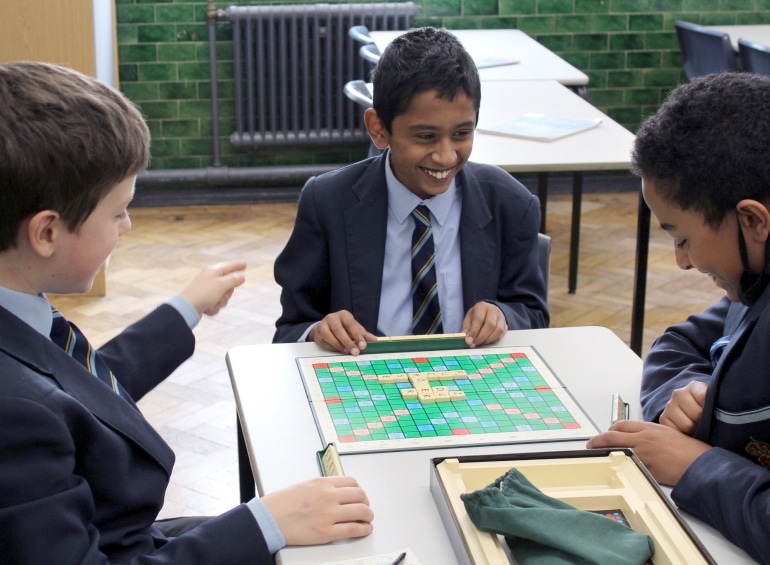
It took a little time to get to grips with the complications of year-group bubbles, staggered lunchtimes and other coronavirus-related restrictions, but QE’s clubs have been firmly back in action this term.
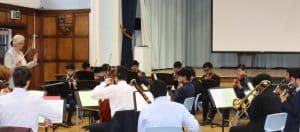 Well over 50 clubs and societies are currently running at the School, covering almost every conceivable interest, from table tennis to practical science, and from manga to Mathematics.
Well over 50 clubs and societies are currently running at the School, covering almost every conceivable interest, from table tennis to practical science, and from manga to Mathematics.
Head of Extra-Curricular Enrichment Rebecca Grundy said: “We normally hold a Clubs and Societies Fair at the start of the School year for Year 7 and 8 boys in our Shearly Hall, but that had to be cancelled because of Covid-19, so instead we have run an online fair on our eQE digital platform to give pupils all the information they need.
“It is a joy to be able to offer so many clubs in these challenging circumstances; our students and teachers have been working hard to maintain a considerable variety of enrichment activities.”
However, although keen to offer as many opportunities as possible, the School remains vigilant regarding the risks of the virus. In fact, some clubs and societies, such as the Christian Union, Science under the Microscope and the Scope and Microscope arts magazine groups are currently meeting online only.
The range of activities on offer includes various Music-related groups (choirs, ensembles and orchestras) as well as clubs and societies for chess, water-polo, Japanese, the Model United Nations debating society, Med Soc, Afro Caribbean Soc and rugby, to name but a few.
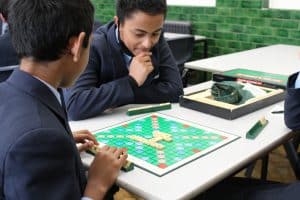 Several clubs take a creative approach to stimulating interest in academic subjects. One that is run on Fridays for Year 8 boys is a regular fixture in young linguist Anik Singh’s week, for example: ”Languages Board Games Club is really fun as well as educational, as we can play our favourite games in a new way and learn new vocabulary at the same time,” he said. Pictured here is a keenly fought round of German Scrabble: one boy is off to a strong start, with ‘Füchse’ (foxes) scoring 26 points.
Several clubs take a creative approach to stimulating interest in academic subjects. One that is run on Fridays for Year 8 boys is a regular fixture in young linguist Anik Singh’s week, for example: ”Languages Board Games Club is really fun as well as educational, as we can play our favourite games in a new way and learn new vocabulary at the same time,” he said. Pictured here is a keenly fought round of German Scrabble: one boy is off to a strong start, with ‘Füchse’ (foxes) scoring 26 points.
At the Tuesday lunchtime Marvel Club, which is run by the boys themselves, the accent is firmly on fun, with Room F recently reverberating to the sound of the highly-rated 2018 superhero film, Avengers: Infinity War.
Higher up the School, the new Music Enrichment Society has already struck a chord, reports Director of Music Ruth Partington.
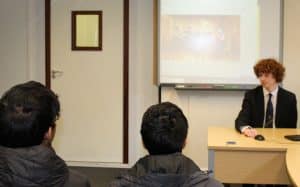 Raphael Herberg, of Year 12, spoke there on the topic of Female Composers. “Raphael gave informative and interesting biographies of the composers Fanny Mendelssohn, Clara Schumann, Lili Boulanger and Judith Weir, and played excerpts of their music, asking the boys present to comment on what they thought of it,” said Miss Partington.
Raphael Herberg, of Year 12, spoke there on the topic of Female Composers. “Raphael gave informative and interesting biographies of the composers Fanny Mendelssohn, Clara Schumann, Lili Boulanger and Judith Weir, and played excerpts of their music, asking the boys present to comment on what they thought of it,” said Miss Partington.
“He posed interesting discussion questions on why female composers were under-represented in the classical music world and what could be done in education settings to alleviate this. The boys enjoyed a lively discussion on the nature of the works studied at GCSE and A-level Music, as well as the music played in our ensembles, and whether female composers should have broader representation here.
“It was wonderful to see one of our A-level musicians talk knowledgably and passionately about this. A great deal of thought and care had gone into the research and presentation of this topic. The boys clearly enjoyed listening to music by composers they had never heard of, and they enthusiastically engaged in the well-led debate.”
Having just been opened to Year 12 boys, it is hoped that the Music Enrichment Society will eventually be open to the whole School, with a session run every half-term.

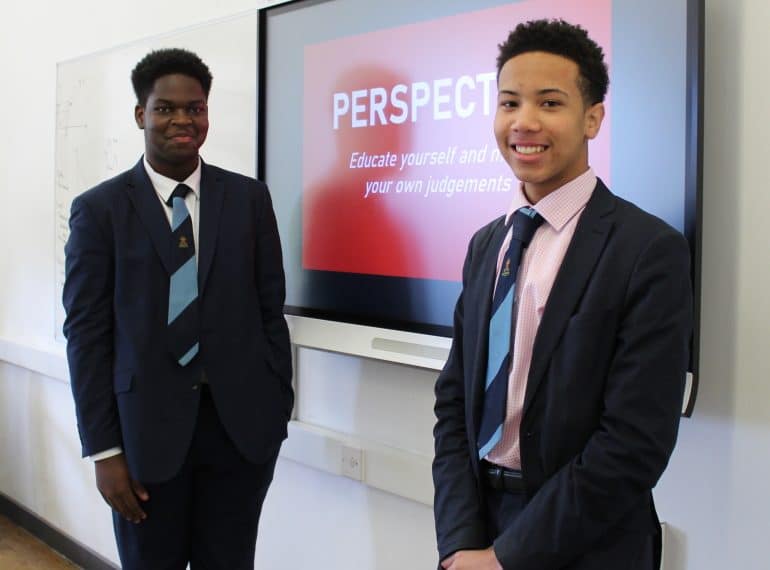
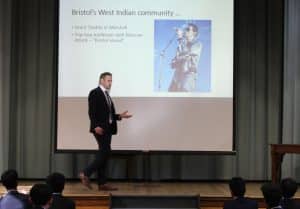 School Vice-Captains Thomas Mgbor and Ayodimeji Ojelade, of Year 13, have been speaking in assemblies at the School, while teachers have also led assemblies and the academic departments are uploading resources to the eQE digital learning platform throughout the month, promoting discussion and awareness in all the subject areas. Pictured here is a Year 12 assembly on Black History Month themes led by Head of Year Simon Walker.
School Vice-Captains Thomas Mgbor and Ayodimeji Ojelade, of Year 13, have been speaking in assemblies at the School, while teachers have also led assemblies and the academic departments are uploading resources to the eQE digital learning platform throughout the month, promoting discussion and awareness in all the subject areas. Pictured here is a Year 12 assembly on Black History Month themes led by Head of Year Simon Walker.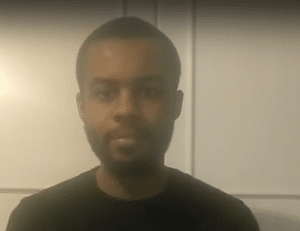 In his video for the younger boys, Ifeanyi began by introducing himself, saying that although his family originally came from Nigeria, he has lived in the UK for his whole life. He recounted his personal history of the “hurtful” comments he received as a teenager, as others questioned his love for the performing arts (including debating, public speaking and acting). “In my teenage years, I became aware of the fact that this choice of passions was unusual for young, black men like me and I was constantly reminded of this by my peers. At the time, I was often called an ‘oreo’, or asked why I didn’t act like a real black guy.” (Merriam-Webster dictionary defines ‘oreo’ as a ‘usually disparaging’ term meaning ‘a black person who adopts the characteristic mentality and behaviour of white middle-class society’.)
In his video for the younger boys, Ifeanyi began by introducing himself, saying that although his family originally came from Nigeria, he has lived in the UK for his whole life. He recounted his personal history of the “hurtful” comments he received as a teenager, as others questioned his love for the performing arts (including debating, public speaking and acting). “In my teenage years, I became aware of the fact that this choice of passions was unusual for young, black men like me and I was constantly reminded of this by my peers. At the time, I was often called an ‘oreo’, or asked why I didn’t act like a real black guy.” (Merriam-Webster dictionary defines ‘oreo’ as a ‘usually disparaging’ term meaning ‘a black person who adopts the characteristic mentality and behaviour of white middle-class society’.)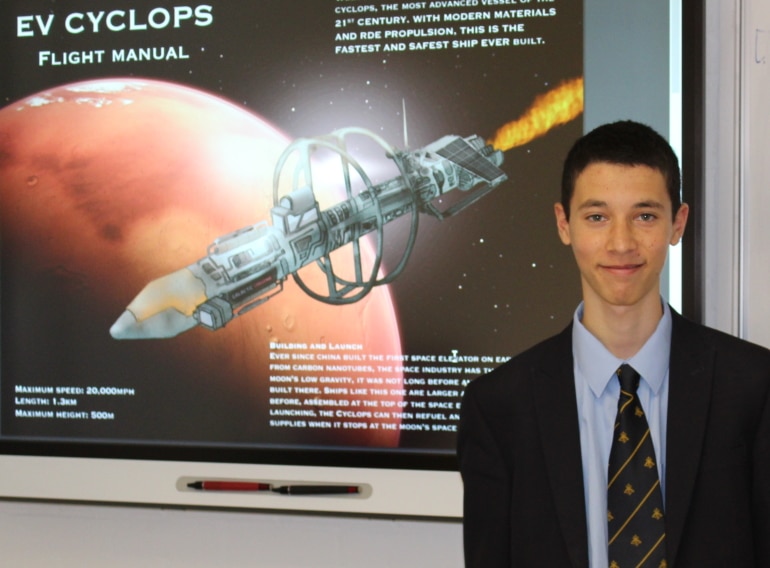
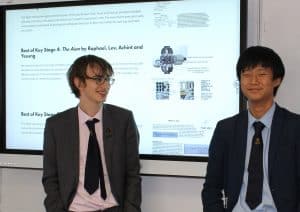 Lev Shafran, Achint Thakkar and Ye-Sung Baek, who are now in Year 12, collectively won the Best of Key Stage 4 Award in the second stage of the
Lev Shafran, Achint Thakkar and Ye-Sung Baek, who are now in Year 12, collectively won the Best of Key Stage 4 Award in the second stage of the 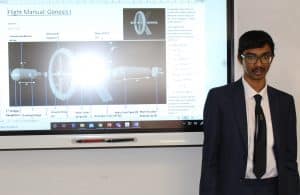 Chair of the Galactic Challenge Aadil Kara, who is also an Old Elizabethan (OE 2010–2017), explained that when Covid-19 forced the cancellation of in-person events, including one due to be held at QE, the organisation had instead launched the digital competition to allow participants to enter from home.
Chair of the Galactic Challenge Aadil Kara, who is also an Old Elizabethan (OE 2010–2017), explained that when Covid-19 forced the cancellation of in-person events, including one due to be held at QE, the organisation had instead launched the digital competition to allow participants to enter from home.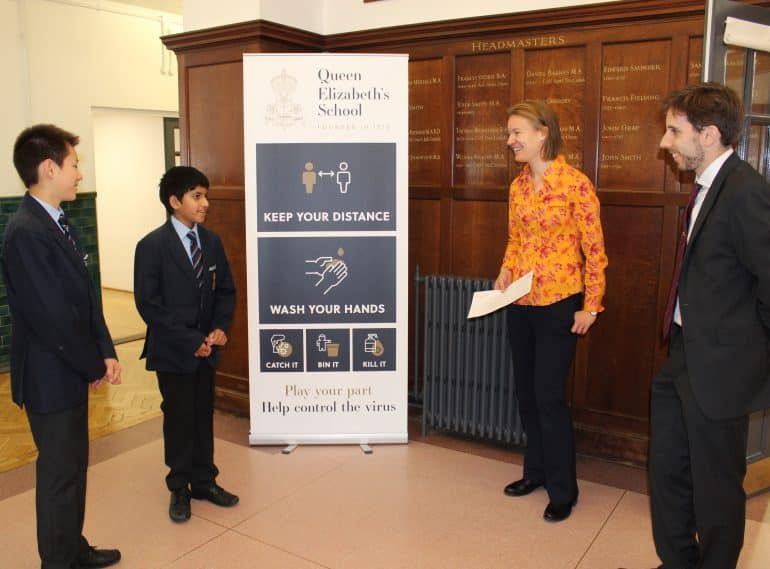
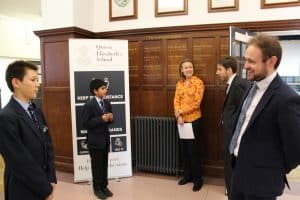 Staff from across the departments took part, showing pupils that poetry is enjoyed by teachers from all subject areas. Boy were invited to approach them during the day and ask them about their choices.
Staff from across the departments took part, showing pupils that poetry is enjoyed by teachers from all subject areas. Boy were invited to approach them during the day and ask them about their choices.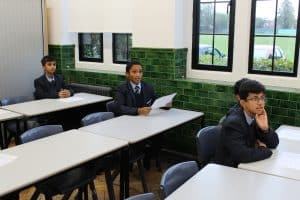 “The staff have nominated an incredibly wide-ranging selection, from poems that inspire, to poems that address problematic issues in the modern world. I’ve really enjoyed reading the selections which teachers have nominated.”
“The staff have nominated an incredibly wide-ranging selection, from poems that inspire, to poems that address problematic issues in the modern world. I’ve really enjoyed reading the selections which teachers have nominated.”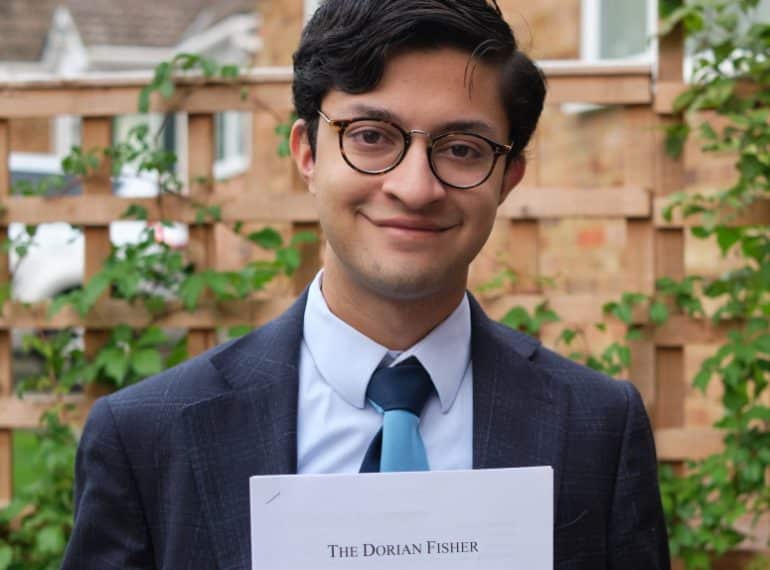
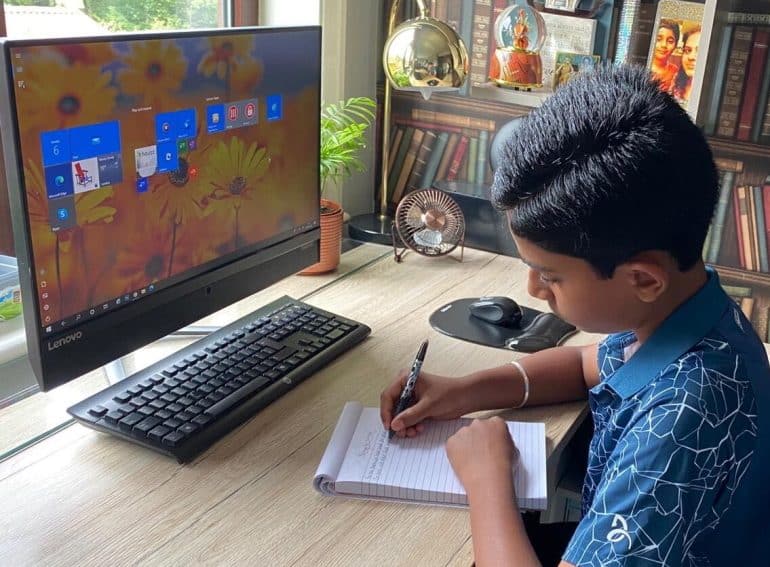
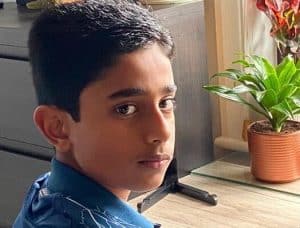 Year 8 boy Surya’s poem, The Pathway to Triumph!, was selected to feature in an international collection of writing from the Young Writers organisation entitled Write To Unite – Together We Stand.
Year 8 boy Surya’s poem, The Pathway to Triumph!, was selected to feature in an international collection of writing from the Young Writers organisation entitled Write To Unite – Together We Stand.